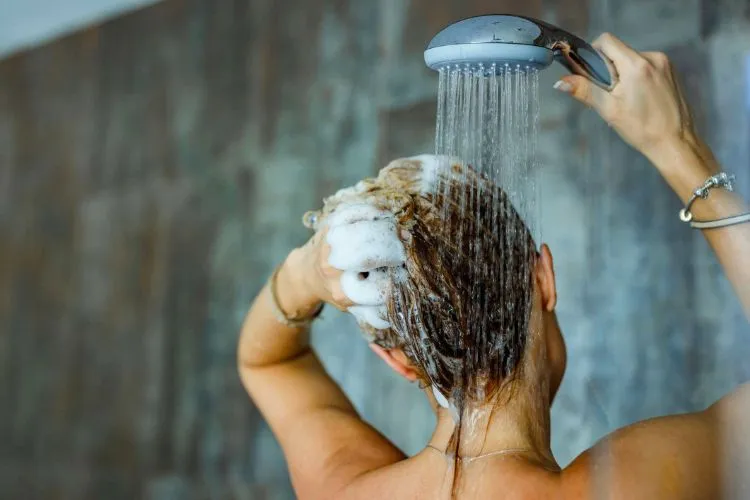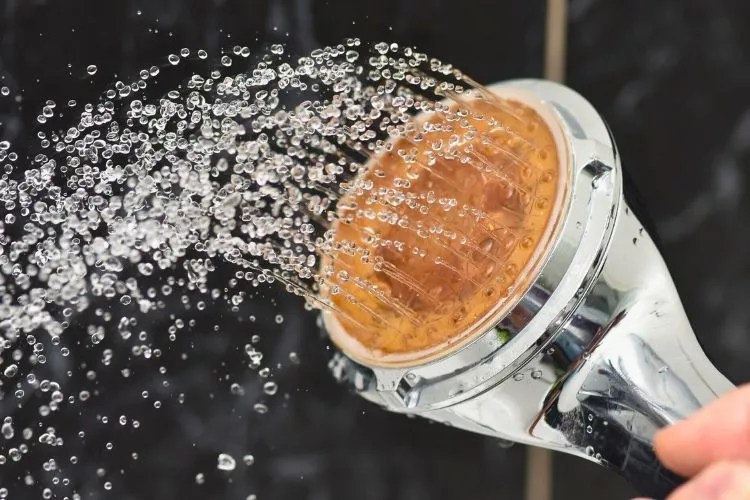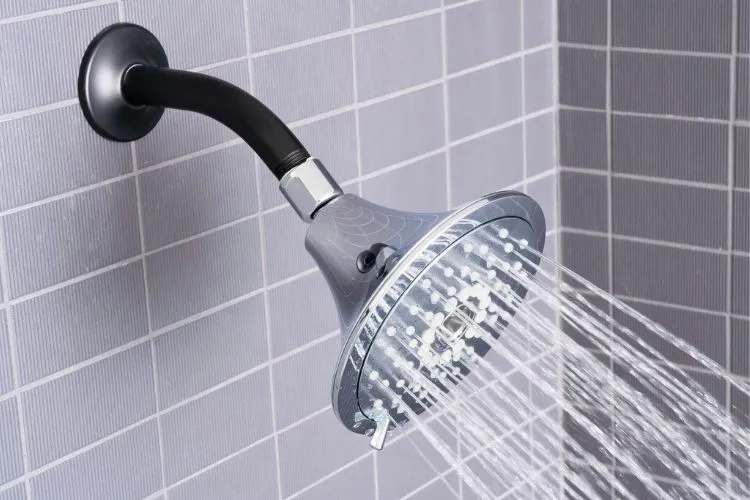Hard water is a common household problem characterized by a high mineral content, primarily calcium and magnesium.
When these minerals accumulate, they can create challenges, particularly in areas like the bathroom.
This article explores effective strategies of how to fix hard water in shower, in order to promote better skin and hair health, and ensuring the longevity of plumbing fixtures.

💦 Understanding Hard Water
Hard water contains high levels of calcium and magnesium. These minerals make the water “hard” and can lead to several household issues, especially in the bathroom.
If you notice a white, chalky residue on your shower tiles and glass, or if your shower head starts to have a reduced water flow, chances are you’re dealing with hard water.
💦 The Detriments of Hard Water
The effects of hard water extend beyond mere spots on fixtures. It can be harsh on your skin and hair, stripping away natural oils and leaving them dry and brittle.

In plumbing, mineral deposits build up over time, reducing efficiency and lifespan of shower heads and pipes.
Moreover, hard water can increase water heating costs as it requires more energy to heat water with a high mineral content.
💦 How To Fix Hard Water In Shower?
Immediate Fixes
Vinegar Solution for Shower Heads
A simple solution to tackle hard water buildup in shower heads is to use vinegar. Fill a bag with white vinegar and attach it to the shower head using a tie.
Let this sit for a few hours, or overnight if possible. This method dissolves the mineral buildup and improves water flow. It’s eco-friendly and cost-effective, making it a great first-line approach.
Purchasing a Shower Head Filter
For those looking to filter out minerals before they hit the shower head, a shower head filter is an excellent option. These filters can remove or reduce minerals and provide cleaner, softer water.
They are easy to install and typically don’t require professional help. Ensure you pick a filter rated for hard water use to enjoy the best results.
Long-Term Solutions
Water Softener Systems
Water softeners are a thorough solution for hard water. These systems use salt to replace hard minerals with sodium, effectively softening the water.
When selecting a water softener, consider the size of your home and the hardness of your water.
These systems do require an initial investment and ongoing maintenance but offer significant benefits in water quality.
Reverse Osmosis Systems
Another robust system is reverse osmosis. This system forces water through a semi-permeable membrane, removing contaminants, including minerals.
It’s particularly effective for improving the quality of shower water and can be combined with other systems to enhance overall water quality.
Magnetic Water Conditioners
Magnetic water conditioners present a non-chemical treatment by using magnetic fields to alter the electromagnetic properties of calcium-carbonate minerals.
This change prevents the minerals from being deposited as scale. Though less common, these conditioners are easy to install and maintain.
💦 Environmental Considerations
The environmental impact of water softening techniques varies widely, with some methods having more ecological footprints than others.
Traditional salt-based water softeners, for example, discharge brine into sewage systems, potentially harming aquatic life by increasing salt concentration in water bodies.
This challenges local ecosystems and can degrade water quality.

On the other hand, salt-free water conditioners and electronic descalers offer more eco-friendly solutions by altering the structure of minerals in water without the use of chemicals or salt, thus eliminating harmful brine discharge.
It’s crucial for homeowners to consider the sustainability of their water softening methods.
Embracing technologies that minimize waste and reduce chemical usage is not only beneficial for the environment but can also lead to long-term cost savings and compliance with local regulations on water treatment.
By prioritizing systems that have a lower environmental impact, individuals can contribute to water conservation efforts and help protect aquatic ecosystems.
💦 Comparison of Hard Water Treatment Options
When comparing hard water treatment methods, salt-based softeners are often the most efficient at removing minerals but come with higher initial costs and ongoing expenses for salt and water used in regeneration.
Maintenance involves regular salt replenishment and system check-ups.
Salt-free conditioners are less costly over time, prevent mineral buildup without chemical discharge, and require minimal maintenance, yet they may not fully “soften” water.

Magnetic and electronic descalers are the cheapest to operate, with no consumables and low maintenance, but their effectiveness varies and may not be as comprehensive as traditional softeners.
Each option presents a trade-off between efficiency, cost, and environmental impact, with the best choice depending on individual needs and values.
💦 Pro Tips
Maintaining systems and addressing hard water does not always require professional help. Regularly cleaning your shower head and checking your plumbing for signs of buildup can prevent major issues.
For those wary of constant maintenance, consider using a whole-home water treatment system to deal with hard water at its source.
💦 frequently asked questions (FAQs)
How do I know if I have hard water in my home?
If you see spots on dishes, feel a film on your hands after washing, or notice buildup in your appliances, you likely have hard water.
Can hard water cause skin irritation or other health issues?
Yes, hard water can dry out skin and hair, potentially leading to irritation or exacerbation of skin conditions like eczema.
Are there any easy tests to check water hardness?
Yes, water hardness test kits are available from hardware stores or online. These often involve a simple strip that changes color indicating the level of hardness.
What is the difference between a water softener and a water conditioner?
Water softeners remove hard minerals completely using salt, while conditioners change mineral properties to prevent buildup without removing them.
How often should I replace the filters or media in my water treatment system?
This depends on the system and your water usage. Generally, check and replace filters every 3-6 months for optimal performance.
Conclusion:
Dealing with hard water in your shower requires understanding the options available and choosing the right solution for your needs.
From simple cleaning hacks like using vinegar to more sophisticated solutions such as installing a water softener, the options are varied.
Investing in these solutions not only improves water quality but also protects your plumbing and enhances your personal health and well-being.

Devon Shorts, a seasoned expert with over a decade of experience in water safety, shares valuable insights on this blog “Aqua Safety Plus”. Trust his expertise to keep your water clean and your family safe.
